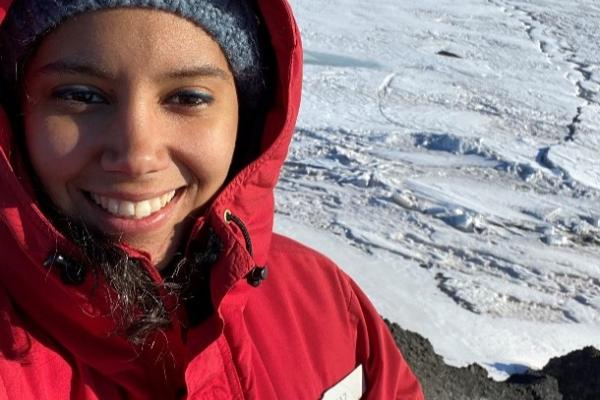Welcoming New SES Professor Melisa Diaz

Dr. Melisa Diaz joined the School of Earth Sciences as a Provost Early Career Scholar Assistant Professor in January 2024. She is an SES alum who earned her PhD in 2020 before starting a prestigious Postdoctoral Scholar position at the Woods Hole Oceanographic Institution. Before returning to SES, Dr. Diaz was an Assistant Professor in the Department of Geography and Institute of Arctic and Alpine Research at the University of Colorado Boulder.
Dr. Diaz runs the Polar and Environmental Geochemistry Lab (Polar ENV), where her core research focuses on the geochemistry of ice-free and ice-covered environments in the Arctic, Antarctic, and Ocean Worlds (e.g., Europa and Enceladus). She applies this knowledge towards understanding landscape development, salt and nutrient cycling, and habitat suitability throughout the Solar System. She is also involved in environmental and social justice work locally and through national organizations. Dr. Diaz is particularly interested in research within the following themes:
- How does the geochemistry of soil and ice in the cryosphere influence ecosystem development and inform habitat suitability on Earth and within the Solar System?
- What are the current, past, and future effects of global change on resource-limited arid environments?
- How do natural systems, urban geochemistry, and equity intersect?
- How have anthropogenic changes perturbed biogeochemical cycles?
In terms of current projects, Dr. Diaz is a co-PI on the McMurdo Dry Valleys Long Term Ecological Research project, based in Antarctica. This project has been funded by the National Science Foundation since 1993 and the current renewal is centered on understanding the structure and functioning of Dry Valleys ecosystems in response to landscape legacy and modern disturbance. Dr. Diaz is currently the lead PI on three proposals to study the biogeochemistry of glacial lake outburst floods, to couple remote sensing and geochemical lab measurements for Ocean World exploration, and to create an experiential learning program for youth in the Rocky Mountains. She is also a co-PI on a project to understand the influence of physical weathering in the generation of nutrients on glaciers and in snowpack. Dr. Diaz is excited to be back in the Buckeye State


